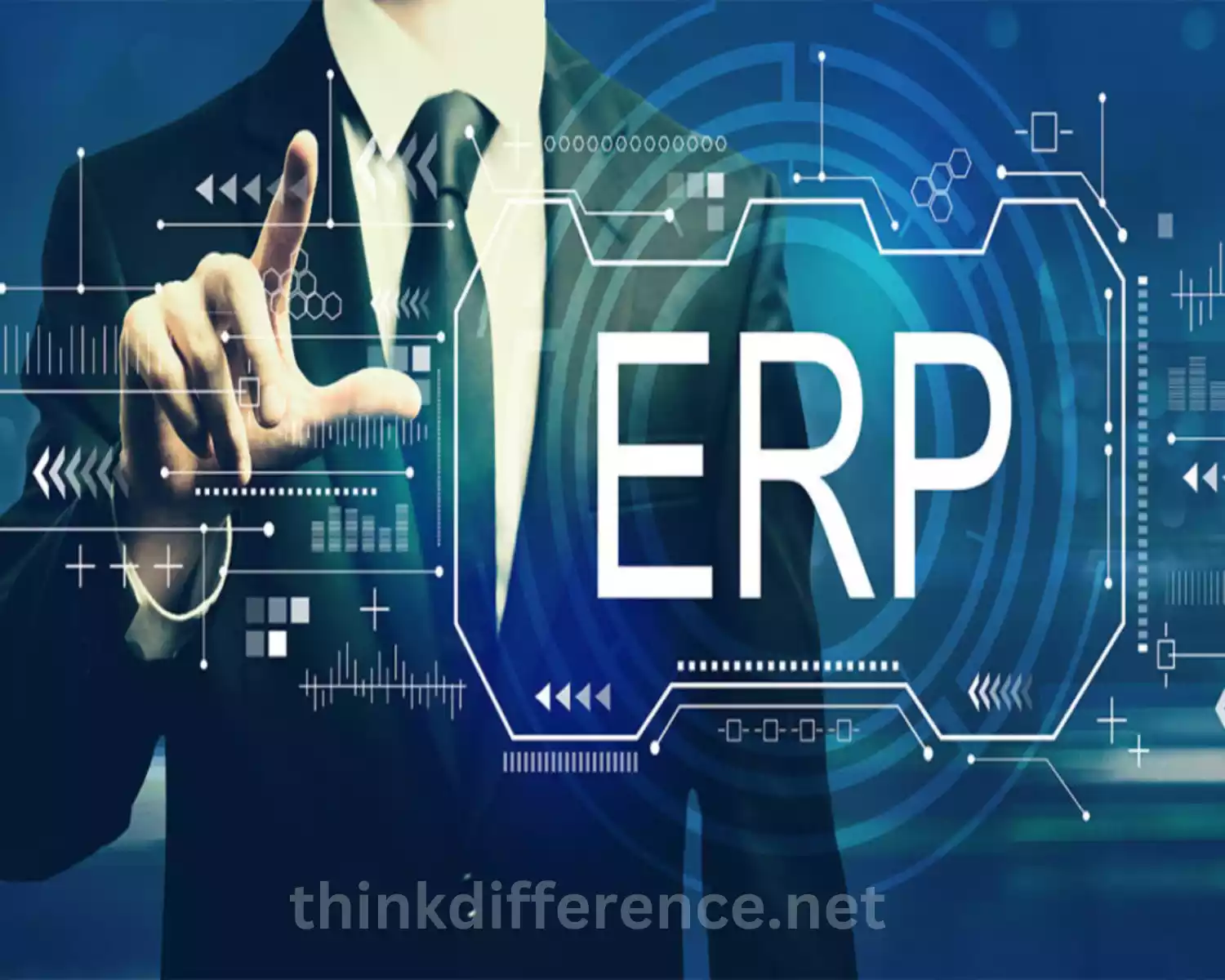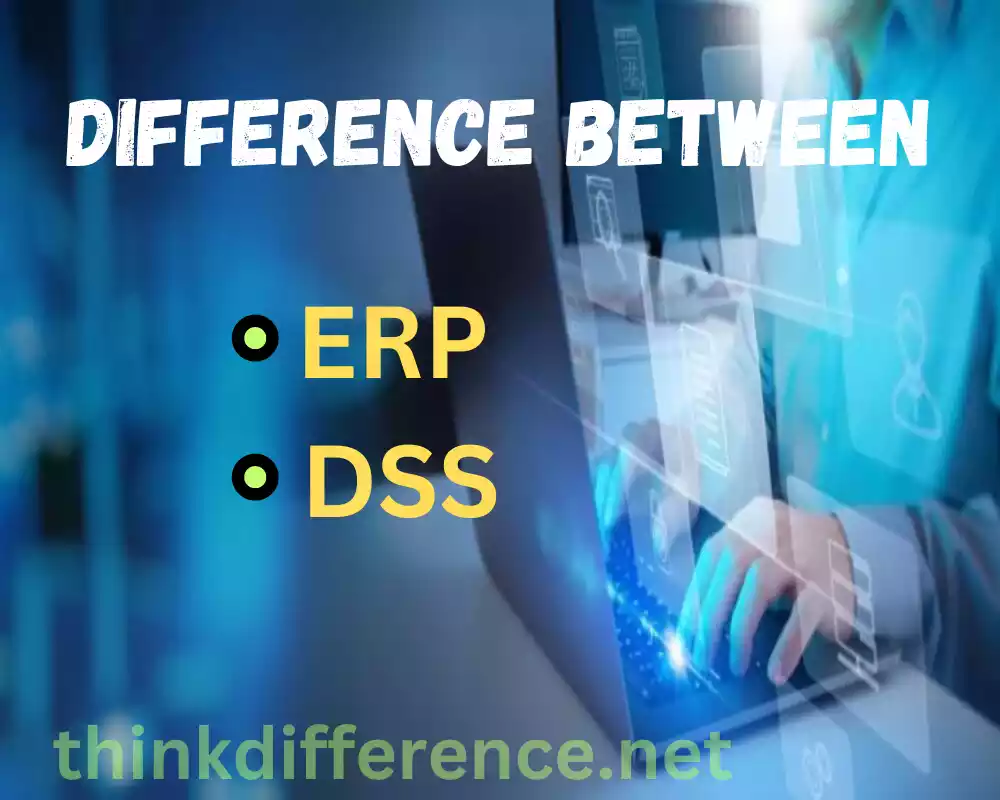ERP and DSS systems can work to address these challenges successfully. ERP is a broad software suite that integrates various aspects of business together in one system – finances and people resources management, inventory control management, sales force automation (SFA) etc. DSS uses advanced analytics and decision models to provide useful insight for making strategic decisions.
Definition of ERP
ERP stands for Enterprise Resource Planning. It refers to a software system that integrates and manages various core business processes within an organization. ERP software facilitates centralized storage, management and analysis from different functional areas including finance supply chain management. Human resource administration manufacturing sales customer relations as well as sales performance measurement.
ERP stands for Enterprise Resource Planning, its goal is to streamline business operations with one comprehensive view of an organization’s information. It enables the automation of routine tasks, standardization of processes and efficient resource utilization. ERP systems facilitate cross-functional collaboration, data sharing and decision-making by providing a comprehensive platform that connects different departments and enables the flow of information.
ERP’s primary goals are to enhance operational efficiencies, increase data accuracy and facilitate improved decision-making by providing reliable information. Through integration of various processes and functions, ERP helps reduce siloed data storage across companies by eliminating data silos while increasing coordination and control across them all.
Its features and functions have been tailored specifically for specific industries and requirements. Making ERP an excellent fit for companies of various sizes across many different types of industries.
Definition of DSS
DSS stands for Decision Support System and refers to an information system built with computers that assists individuals or companies make more informed and efficient decision-making processes at various levels and areas. DSS includes models, data analysis techniques and interactive tools designed specifically to aid decision making processes across several dimensions and layers of hierarchy.
DSS are designed to aid decision-makers by providing essential data, analysis and tools. Users of the system are assisted in exploring different possibilities and exploring possible outcomes before implementing. Insightful “what-if” analysis helps decision makers gain knowledge from available evidence for more informed choices and decisions are made more swiftly using data-driven evidence.
A DSS typically includes the following components:
- Data Management: DSS involves collecting, storing and organizing relevant data from internal and external sources to support decision-making processes.
- Model Base: It includes mathematical, statistical or analytical models that help analyze data and simulate different scenarios.
- User Interface: DSS provides an interactive interface that allows users to input data, define parameters and interact with the system to generate insights and evaluate alternatives.
- Decision Support Tools: DSS incorporates various tools such as data visualization, reporting and ad hoc querying to facilitate data analysis and interpretation.
- Decision Process Support: DSS assists in structuring decision processes, guiding users through different steps and providing decision frameworks and guidelines.
DSS (Decision Support System) is an indispensable tool that can be utilized across industries and applications ranging from marketing to finance operations, strategic planning and risk-management. DSS augments human decision-making abilities using technology to analyze large volumes of data allowing more effective and efficient decision-making to occur.
Importance of understanding the difference between ERP and DSS
Understanding the differences between ERP DSS and ERP DSS solutions is imperative for various reasons, including:
- Clear Role Differentiation: ERP and DSS serve distinct purposes within an organization. Recognizing their differences helps avoid confusion and ensures that each system is appropriately utilized. By understanding their respective roles, organizations can make informed decisions about which system or combination of systems is most suitable for specific business needs.
- Effective Resource Allocation: ERP and DSS systems require significant investments in terms of time, money and resources. Understanding their differences allows organizations to allocate resources appropriately based on their priorities. It helps in determining where to focus efforts and investments for maximum impact on operational efficiency, data analysis and decision-making.
- Improved Operational Efficiency: ERP systems focus on integrating and automating core business processes, leading to increased operational efficiency and productivity. DSS provides decision-making support by analyzing data, generating insights, and facilitating scenario analysis. By understanding the distinction, organizations can optimize their operational processes using ERP and leverage DSS to enhance decision-making capabilities.
- Enhanced Decision-making: DSS enables decision-makers to access timely, relevant and analyzed data, empowering them to make informed decisions. Understanding the differences between ERP and DSS allows organizations to harness the power of each system to its full potential. By utilizing ERP for operational data processing and DSS for analytical data processing, organizations can enhance decision-making accuracy and improve overall business performance.
- Tailored Solution Selection: Different organizational needs call for different software solutions. Understanding the distinctions between ERP and DSS enables organizations to select the most appropriate system or combination of systems to meet their specific requirements. It helps in making informed decisions during the software selection process, ensuring that the chosen solution aligns with the organization’s goals and objectives.
- Strategic Planning: Clear differentiation between ERP and DSS is crucial for strategic planning purposes. Organizations can assess their current and future needs in terms of operational efficiency and decision-making support. This understanding allows them to develop a roadmap for integrating and leveraging these systems effectively to achieve strategic objectives.
Understanding the difference between ERP and DSS enables organizations to optimize their operational processes, enhance decision-making capabilities, allocate resources effectively and select tailored software solutions. It empowers organizations to leverage the strengths of each system to improve overall performance, efficiency and competitiveness.
ERP (Enterprise Resource Planning)
ERP, which stands for Enterprise Resource Planning, is a software system that integrates and manages various core business processes within an organization. Information management platforms serve as central hubs to organize, store and analyze information from different functional areas – human resources, finances and supply chain management among them – in addition to manufacturing sales as well as managing customer relations.

The primary purpose of ERP is to streamline and optimize business operations by providing a unified and real-time view of organizational data. It aims to eliminate data silos and enhance cross-functional collaboration by integrating different departments and functions. By doing so, ERP enables the automation of routine tasks, standardization of processes and efficient resource utilization.
Key features of ERP include:
- Integration and Centralization of Data: ERP systems integrate data from various departments and functions into a single database, providing a unified view of information across the organization. This integration enables data consistency, accuracy, and reliability.
- Automation of Business Processes: ERP automates and streamlines routine business processes, reducing manual effort and increasing operational efficiency. It allows for standardized workflows, ensuring consistency and compliance across the organization.
- Standardization and Streamlining of Operations: ERP enables organizations to establish standardized practices and processes, promoting efficiency and reducing errors. It facilitates the adoption of best practices and allows for the optimization of operations.
Benefits of implementing an ERP system include:
- Improved Efficiency and Productivity: ERP eliminates manual tasks and automates processes, leading to increased efficiency and productivity. It reduces redundant data entry, minimizes errors, and enables faster and more accurate information flow.
- Enhanced Data Accuracy and Integrity: ERP provides a single source of truth for organizational data, reducing data discrepancies and improving data accuracy. Ensuring information accuracy and access for decision-making.
- Better Decision-making through Real-time Insights: ERP systems offer real-time reporting and analytics capabilities, providing decision-makers with timely and relevant information. Data-driven decision making, improved forecasting and more effective strategic planning become possible as a result.
SAP, Oracle ERP, Microsoft Dynamics 365 and NetSuite are some of the most frequently utilized ERP software systems and offer exceptional levels of configurability to meet various industries and company needs.
DSS (Decision Support System)
DSS stands for Decision Support System and refers to any information system designed to aid individuals or companies when making choices. DSS serves as an analysis model, analytics capabilities and decision aiding features across different levels and in multiple areas to aid decision makers when they make choices.

Decision Support Systems or DSSs, exist to aid decision makers by providing relevant data, analysis and insight. DSS helps evaluate options as well as assess risks before forming their final judgment on potential outcomes before taking a definitive stance on one. DSS makes use of technology for data processing so users make more informed and ethical choices when it comes to decision-making.
Key features of DSS include:
- Data Analysis and Modeling: DSS incorporates tools for data analysis and modeling to help users understand trends, patterns, and relationships within the data. It enables users to apply statistical, mathematical and analytical techniques to explore data and gain insights.
- What-if Analysis and Scenario Planning: DSS allows users to perform “what-if” analysis by changing variables or parameters and observing the potential outcomes. It helps users assess the impact of different scenarios and make more informed decisions based on projected results.
- Decision-making Support: DSS provides decision-makers with relevant information, reports, and dashboards to support their decision-making process. It presents data in a structured and intuitive manner, allowing decision-makers to grasp key insights quickly.
Benefits of utilizing a DSS include:
- Enhanced Decision-making Accuracy: DSS equips decision-makers with accurate and up-to-date data that allows for informed choices through data-driven insights. By eliminating intuition-based decision making processes and simplifying subjective judgement, this tool supports more precise and more effective decision-making practices.
- Improved Planning and Forecasting: DSS facilitates strategic planning and forecasting by enabling users to analyze historical data, perform trend analysis, and make projections. It helps organizations anticipate future scenarios, identify opportunities, and plan accordingly.
- Increased Collaboration and Communication: DSS supports collaborative decision-making by allowing multiple users to access and analyze the same information simultaneously. It promotes sharing of insights, discussions and consensus-building among decision-makers, leading to better collective decisions.
Examples of DSS tools include data visualization software, business intelligence platforms, decision trees, simulation models, and predictive analytics tools. DSS tools can be applied in various areas, including financial analysis sales forecasting financial analysis supply chain management as well as strategic planning. DSS can be tailored specifically for any organization’s requirements or decision making processes and decisions made using them can be customized accordingly.
Comparison Between ERP and DSS
When comparing ERP (Enterprise Resource Planning) and DSS (Decision Support System), several key differences arise:
- Focus and Scope:
- ERP: ERP systems have a broad focus and aim to integrate and manage various core business processes within an organization. They provide a centralized platform for data management, process automation and operational efficiency.
- DSS: DSS systems, on the other hand, have a narrower focus on decision-making support. Data analysts provide tools and capabilities for analyzing information, uncovering insights and supporting decision making processes.
- Data Processing and Analysis:
- ERP: ERP systems primarily focus on operational data processing. Maintain transactional information related to daily business operations such as invoices, sales orders and inventory as well as employee records.
- DSS: DSS systems specialize in analytical data processing. Data analytics tools offer in-depth data analyses by applying mathematical, statistical and modeling approaches that uncover patterns and relationships within data sets.
- Time Horizon:
- ERP: ERP systems are designed for long-term planning and execution. They provide functionality for strategic planning, resource allocation and forecasting over extended periods.
- DSS: DSS systems cater to short-term decision-making. They support immediate or near-term decisions, offering real-time or near-real-time data analysis and insights for timely actions.
- User Roles and Functions:
- ERP: ERP systems serve a wide range of users across different levels of the organization, including operational staff, managers, and executives. They focus on providing tools and features for efficient day-to-day operations and process management.
- DSS: DSS systems target specific user roles involved in decision-making processes, such as analysts, decision-makers and strategic planners. They provide advanced analytics, modeling tools and interactive interfaces to support data-driven decision-making.
- Integration and Interactions:
- ERP: ERP systems excel at integrating and centralizing data from various business functions, such as finance, HR, supply chain, and sales. They ensure seamless data flow and interaction between different modules within the ERP system.
- DSS: DSS systems often interact with external data sources beyond the organization’s internal systems. They may retrieve data from external databases, industry reports, market research or other sources to enhance decision-making capabilities.
Understanding these differences between ERP and DSS helps organizations determine the appropriate system for their specific needs. While ERP focuses on operational efficiency and process integration, DSS concentrates on analytical support for decision-making. Organizations often benefit from utilizing both systems in tandem, leveraging the strengths of each to enhance overall organizational performance.
Use Cases and Examples
Use Cases and Examples:
ERP Use Cases:
- Supply Chain Management: ERP systems are widely used to optimize supply chain processes, including inventory management, procurement, demand planning and logistics. Companies can track inventory levels, streamline procurement processes and improve coordination with suppliers and distributors.
Example: An auto manufacturer employs an ERP system to streamline its supply chain management, from manufacturing planning and inventory control, through logistics services that will guarantee fast component deliveries onto production lines. - Human Resources Management: ERP systems help organizations manage their human resources functions, including employee data, payroll processing, benefits administration and performance management. They centralize HR data, automate processes and ensure compliance with labor regulations.
Example: A multinational corporation implements an ERP system to consolidate employee data from different locations, automate payroll calculations and streamline the recruitment and onboarding process. - Financial Management: ERP systems provide comprehensive financial management capabilities, including general ledger, accounts payable, accounts receivable, budgeting and financial reporting. They enable real-time financial visibility, streamline financial processes and facilitate accurate reporting.
Example: A retail chain adopts an ERP system to standardize financial processes across multiple stores, allowing for consistent financial reporting, automated reconciliation of sales transactions and centralized cash flow management.
DSS Use Cases:
- Sales and Marketing Analysis: DSS systems assist in analyzing sales and marketing data to identify trends, customer preferences, and market opportunities. They enable sales forecasting, campaign performance analysis, customer segmentation and target market identification.
Example: An e-commerce company uses a DSS tool to analyze customer buying patterns, identify cross-selling and upselling opportunities, and optimize marketing campaigns based on customer segments. - Risk Assessment and Management: DSS systems aid in assessing and managing risks by analyzing relevant data and providing risk mitigation strategies. They support scenario analysis, risk modeling and simulation to evaluate potential outcomes and make informed decisions.
Example: A financial institution utilizes a DSS to assess credit risk for loan applications, analyzing various factors such as credit scores, income levels and historical payment behavior to determine the risk associated with each applicant. - Strategic Planning and Forecasting: DSS systems assist in strategic decision-making by providing data-driven insights and predictive analytics. They support scenario planning, market trend analysis, competitive intelligence and resource allocation for long-term planning.
Example: A manufacturing company employs a DSS tool to analyze market demand, forecast sales volumes and evaluate different production scenarios to optimize capacity planning and align production resources accordingly.
These use cases illustrate how ERP and DSS systems are applied in different functional areas to enhance operational efficiency, decision-making and overall organizational performance.
Challenges and Considerations in Adopting ERP and DSS

Adopting ERP (Enterprise Resource Planning) and DSS (Decision Support System) can bring significant benefits to organizations but it is essential to consider and address certain challenges and considerations.
Here are some key challenges and considerations when adopting ERP and DSS:
- Complexity and Customization: ERP and DSS implementations can be complex and require customization to meet specific organizational requirements. Organizations should carefully evaluate their needs, engage in thorough planning, and ensure that the chosen system aligns with their business processes. Customization efforts should be managed effectively to avoid excessive complexity and potential compatibility issues.
- Data Integration and Migration: Implementing ERP and DSS often involves integrating data from disparate systems and sources. Organizations may face challenges in data mapping, cleansing and migration to ensure accurate and consistent data in the new system. Careful data analysis and migration strategies should be developed to minimize data-related issues and ensure a smooth transition.
- Change Management and User Adoption: Introducing new systems like ERP and DSS requires organizational change management efforts. Employees may resist change, especially if they are accustomed to existing processes and systems. Organizations should invest in comprehensive change management strategies, including communication, training and user engagement, to facilitate user adoption and ensure successful implementation.
- System Compatibility and Integration: Organizations may already have existing systems in place, such as legacy software or specialized applications. Ensuring compatibility and seamless integration between ERP, DSS and other systems is crucial for data consistency, process efficiency and information flow. Integration challenges should be addressed through system evaluation, API development or middleware solutions.
- Scalability and Flexibility: Organizations should consider the scalability and flexibility of ERP and DSS solutions. As businesses evolve and grow, the systems should be able to accommodate increased data volumes, user demands and changing business needs. Scalability considerations should be included in system selection, implementation and future planning.
- Security and Data Privacy: ERP and DSS systems house sensitive business data and information. Organizations must prioritize security measures, including access controls, data encryption and regular system audits, to protect against unauthorized access, data breaches and potential risks to privacy. Compliance with data protection regulations should also be ensured.
- Cost and Return on Investment: Implementing and maintaining ERP and DSS systems involve significant costs, including software licensing, implementation services, infrastructure upgrades and ongoing support and maintenance. Organizations should carefully assess the total cost of ownership and conduct a thorough cost-benefit analysis to ensure a positive return on investment.
- Vendor Selection and Support: Choosing the right ERP and DSS vendors is critical for successful implementation and long-term support. Organizations should evaluate vendors based on their industry expertise, system functionality, implementation track record, customer support and long-term viability. Conducting thorough vendor assessments and seeking references can help mitigate risks associated with vendor selection.
By addressing these challenges and considerations, organizations can increase the likelihood of successful adoption and maximize the benefits of ERP and DSS systems. It is crucial to have a clear understanding of the organization’s needs, establish a robust implementation plan, engage stakeholders and proactively manage the change process to drive successful outcomes.
Future Trends and Innovations in ERP and DSS
Future trends and developments within ERP and DSS could significantly shape their respective futures, here are the top ones you should keep an eye out for:
- Cloud-based Solutions: Cloud computing is increasingly becoming the norm for ERP and DSS systems. Cloud-based solutions offer scaleable flexibility and affordability, enabling users to access them at any time from any place in the world. Cloud deployment also facilitates seamless integration with other applications and enables easy upgrades and maintenance.
- Artificial Intelligence (AI) and Machine Learning (ML): AI and machine learning (ML) technologies offer ERP or DSS systems a serious boost, by helping analyze large volumes of data, identify patterns in them and generate predictions to assist decision-making processes. AI algorithms have the capacity to read through massive amounts of information quickly to produce predictions to aid decision makers during decision-making processes. ML algorithms can continuously learn from data, enabling automated process optimization, anomaly detection and personalized recommendations.
- Advanced Analytics and Visualization: The integration of advanced analytics and visualization capabilities within ERP and DSS systems will enable users to gain deeper insights from data. Interactive dashboards, data visualization tools and self-service analytics capabilities allow users to dive deeper into data sets quickly, conduct real-time analyses on demand and make data-based decisions without delay.
- Internet of Things (IoT) Integration: IoT devices generate massive amounts of data that can be leveraged within ERP and DSS systems. Integrating IoT data into these systems will enable organizations to monitor and control physical assets, optimize supply chain processes and gain real-time insights for proactive decision-making.
- Integration with External Data Sources: ERP and DSS systems will increasingly integrate external data sources such as social media, market research reports and industry benchmarks. This integration will provide a broader context for decision-making, enabling organizations to incorporate external factors and market trends into their analyses and strategies.
- Mobile and Voice-enabled Interfaces: The use of mobile devices and voice assistants will continue to grow in ERP and DSS systems. Mobile apps and voice-enabled interfaces will enable users to access and interact with the systems on the go, providing real-time information, alerts and decision support through voice commands or mobile interfaces.
- Blockchain for Data Security and Trust: Blockchain technology has the potential to enhance data security, integrity and trust within ERP and DSS systems. By utilizing decentralized and immutable ledger technology, organizations can secure sensitive data, track transactions and ensure data integrity throughout the supply chain, financial processes and decision-making workflows.
- Predictive and Prescriptive Analytics: ERP and DSS systems will increasingly incorporate predictive and prescriptive analytics capabilities. These systems will not only provide insights into historical and current data but also generate predictions and recommendations for future actions. This will enable organizations to proactively identify opportunities, optimize resource allocation and mitigate risks.
Businesses must remain abreast of emerging ERP and DSS trends and advancements to stay at the cutting-edge. Analyzing how relevant each of these innovations are to their business or industry will assist businesses in using ERP/DSS tools more strategically, giving them a competitive advantage and helping make informed decisions for the near future.
Conclusion
ERP and DSS are valuable tools that can transform businesses by streamlining operations and empowering data-driven decision-making. Integrating these systems offers enhanced synergy and improved efficiency, ensuring organizations stay competitive in the digital age. Embracing ERP and DSS will be a pivotal step towards achieving success in today’s fast-paced business landscape.



